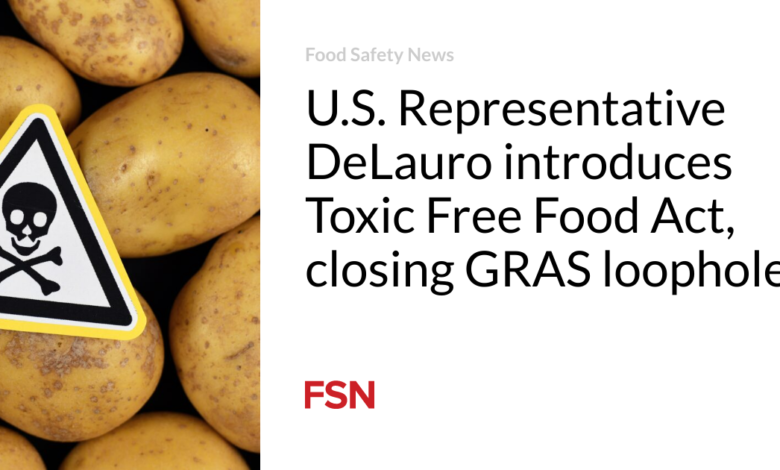U.S. Representative DeLauro introduces Toxic Free Food Act, closing GRAS loophole

Representative Rosa DeLauro, D-CT, has introduced the Toxic Free Food Act, which would require the FDA to close the “Generally Recognized as Safe” (GRAS) loophole and make chemical food additives subject to FDA approval and oversight.
The veteran lawmaker also submitted public comment to the Food and Drug Administration as the agency works to develop a post-market assessment system of chemicals in foods, urging the agency to close the GRAS loophole that allows companies to self-certify that new ingredients are safe for consumers and voluntarily decide whether to notify the FDA of their conclusions.
“When Americans are shopping at the grocery store, they should be confident that the food they are purchasing is safe for consumption and does not contain any harmful chemical additives that could result in illness or death,” said Rep. DeLauro.
“The GRAS loophole allows companies to decide whether additives are safe to add, skirting FDA oversight and allowing potentially dangerous chemicals to reach the market. That cannot stand. I have urged the FDA to close this loophole, and I am proud to introduce the Toxic Free Food Act to ensure that chemical food additives are subject to FDA approval.”
The GRAS loophole was initially intended to cover safe ingredients, such as vegetable oil, flour, baking soda, and spices. In 1997, the FDA loosened the existing protocol, creating the “voluntary notification” system. Now, companies can declare substances as GRAS, allowing hundreds of new chemicals, to be introduced in our foods with little to no FDA oversight.
The Toxic Free Food Act would require the FDA to incorporate specific requirements into its regulations about Generally Recognized As Safe (GRAS) food substances, including specific restrictions on substances that cause cancer or human reproductive or developmental toxicity. The bill text is here.
“None of us should have to worry about whether the food we eat and feed to our families is safe,” said Environmental Working Group Policy Director Jessica Hernandez. “For too long, the FDA has allowed the food and chemical industry to decide whether certain chemicals, like toxic ‘forever chemicals’ known as PFAS, are safe to eat. The Toxic Free Food Act will protect consumers by putting the FDA back in charge of food safety, not the food and chemical companies. EWG applauds Congresswoman DeLauro for her leadership on this important public health issue.”
The food industry has not yet commented on the bill, but it is unlikely to want to give up GRAS.
“Current regulations that allow food manufacturers to self-regulate and determine the safety of food chemicals without any FDA review is completely unacceptable,” said Brian Ronholm, Director of Food Policy for Consumer Reports. “The Toxic Free Food Act would close this dangerous loophole and stop this secret process that hides safety data, and allow the FDA to determine the safety of substances added to food.”
“Food companies can add chemicals to foods without ever notifying or providing safety data to the FDA. The Toxic Free Food Act is a much-needed step to empower the FDA to protect consumers from harmful chemicals in our foods.” said President of Center for Science in the Public Interest, Peter Lurie, MD, MPH.
DeLauro also submitted written comments to the FDA for their public meeting on developing post-market assessments of chemicals in foods, urging the agency to close the GRAS loophole.
“For too long, this loophole and FDA inaction have failed to keep us safe from chemicals added to our food,” DeLauro wrote. “. . . To rebuild consumer confidence, the FDA must take bold action to ban or restrict food chemicals of concern and to reassert its regulatory role and close the loopholes that allow the chemical companies to decide which chemicals are safe for consumers voluntarily.”
DeLauro’s full comments are found here.
(To sign up for a free subscription to Food Safety News, click here.)


